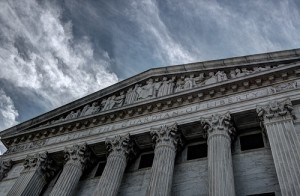Week in Review: Court Considers Four Cases

The U.S. Supreme Court ended the week last week granting certiorari in Whole Woman’s Health v. Cole, their first case involving abortion since 2007. In addition, they heard argument on the following cases, summarized below:
Green v. Brennan:
In deciding the key labor law case, the justices must resolve a circuit split regarding how long plaintiffs have to file constrictive discharge suits. The specific issue is whether, under federal employment discrimination law, the filing period for a constructive discharge claim begins to run when an employee resigns, as five circuits have held, or at the time of an employer’s last allegedly discriminatory act giving rise to the resignation, as three other circuits have held.
Montanile v. Board of Trustees of the National Elevator Industry Health Benefit Plan:
The case involves the remedies available under the Employee Retirement and Income Security Act of 1974 (ERISA). The specific issue before the Court is whether a lawsuit by an ERISA fiduciary against a participant to recover an alleged overpayment by the plan seeks “equitable relief” within the meaning of ERISA Section 502(a)(3), 29 U.S.C. § 1132(a)(3), if the fiduciary has not identified a particular fund that is in the participant’s possession and control at the time the fiduciary asserts its claim.
Tyson Foods, Inc. v. Bouaphakeo:
The closely watched case addresses the standards for class certification. The specific issues before the Court include: (1) Whether differences among individual class members may be ignored and a class action certified under Federal Rule of Civil Procedure 23(b)(3), or a collective action certified under the Fair Labor Standards Act, where liability and damages will be determined with statistical techniques that presume all class members are identical to the average observed in a sample; and (2) whether a class action may be certified or maintained under Rule 23(b)(3), or a collective action certified or maintained under the Fair Labor Standards Act, when the class contains hundreds of members who were not injured and have no legal right to any damages.
Luis v. United States:
Federal law authorizes district courts issue pretrial orders that restrain the assets of those accused of certain kinds of fraud. This case addresses whether the pretrial restraint of a criminal defendant’s legitimate assets that are not traceable to a criminal offense and are needed to retain counsel of choice violates the Fifth and Sixth Amendments.
Previous Articles
SCOTUS Decision in Bowe v. United States Is First of the 2026 Term
by DONALD SCARINCI on February 5, 2026
In Bowe v. United States, 607 U.S. ___ (2026), the U.S. Supreme Court held that Title 28 U.S.C. § ...
SCOTUS Rules State Can’t Immunize Parties from Federal Civil Liability
by DONALD SCARINCI on January 29, 2026
In John Doe v. Dynamic Physical Therapy, LLC, 607 U.S. ____ (2025) the U.S. Supreme Court held that...
Supreme Court to Address Racial Discrimination in Jury Selection
by DONALD SCARINCI onWhile the U.S. Supreme Court has concluded oral arguments for the year, it continues to add cases t...
The Amendments
-
Amendment1
- Establishment ClauseFree Exercise Clause
- Freedom of Speech
- Freedoms of Press
- Freedom of Assembly, and Petitition
-
Amendment2
- The Right to Bear Arms
-
Amendment4
- Unreasonable Searches and Seizures
-
Amendment5
- Due Process
- Eminent Domain
- Rights of Criminal Defendants
Preamble to the Bill of Rights
Congress of the United States begun and held at the City of New-York, on Wednesday the fourth of March, one thousand seven hundred and eighty nine.
THE Conventions of a number of the States, having at the time of their adopting the Constitution, expressed a desire, in order to prevent misconstruction or abuse of its powers, that further declaratory and restrictive clauses should be added: And as extending the ground of public confidence in the Government, will best ensure the beneficent ends of its institution.





